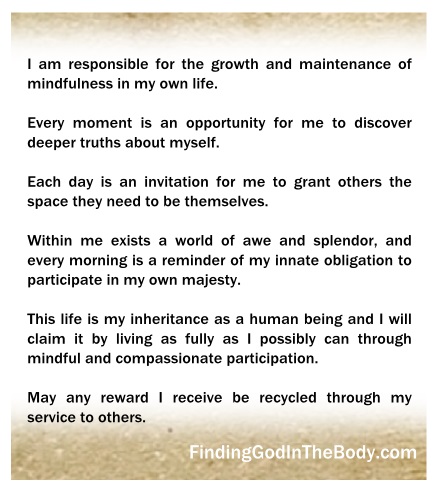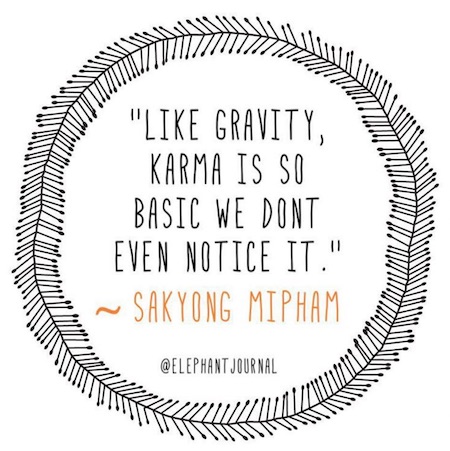It’s a New Year, and with every New Year comes new resolutions.
Unfortunately, many of our resolutions turn to disappointment when we are unable to overcome the inevitable struggles that transform a resolution into a new way of life. How do we turn the corner?
Perhaps the Buddhist teachings on Karma can help.
Karma is a central concept in Buddhism. You might even call it a law. Karma means action. More broadly speaking, karma is the principle of creation. It is the law of cause and effect that states for every action there is a result; that result is similar in nature to its cause; the effect produced will itself become a cause, which will produce effects that are similar in nature. In other words, our deeds shape the world we live in.
The world is our creation.
There are four components that contribute to the potency of a karmic seed: understanding, intention, the act itself, and the dedication.
For example, if someone is sensitive about their body image and we know this, intend to hurt them with a hurtful remark, and are happy that we hurt their feelings, then we plant a particularly negative karmic seed in our mind-stream. However, if we are unaware of their sensitivity, have no intention of hurting them, make a careless remark, and feel bad about hurting their feelings, the imprint will not be as potent.
How does this information help with our New Year’s resolutions?
The more potent the karmic seed, the more likely it will ripen in the future. Therefore, we are more likely to keep our New Year’s resolutions if they are built upon this karmic foundation. If our resolutions are rooted in understanding, intention, mindful action, and the merits are dedicated to the benefit of others, then our resolutions are more likely to become a reality.
If, on the other hand, our resolutions are nothing more than whimsical attempts to install healthy habits or desperate attempts to renounce self-defeating patterns, they are unlikely to make it past February.
Let’s say our New Year’s resolution is to start a daily meditation practice. If that resolution is supported by nothing more than a desire to meditate every day, it will soon fizzle out. Desire is fleeting. The day will come when we do not want to meditate. This is why the Buddhist tradition uses karmic principles to support the practice of meditation. First, you learn about the benefits of meditation and recall those benefits before you sit. Next, prayer is used to cultivate your intent before you begin meditating (see prayer below). Then, you begin the practice. When you are finished, you use prayer to dedicate the merits of your practice to the world in which you live. This four pronged approach strengthens your practice, ensuring its longevity.

This karmic approach to recreating your world can be applied to any New Year’s resolution.
If your New Year’s resolution is to exercise every day, then develop a clear understanding of the benefits of exercise, use prayer to transform that understanding into focused intention, carry that intent into each moment of your workout, and dedicate the merits of your exercise to the people you love.
Similarly, if your New Year’s resolution is to give up a bad habit, like eating copious amounts of sugar: understand how that behavior negatively impacts your quality of life, cultivate your intent to renounce that behavior, bring awareness (not judgment) into the choices you make, and dedicate the merit of those choices to the people in your life.
In addition to these karmic principles, there are a few other tips that might prove helpful. First, don’t set yourself up for failure. Set realistic goals. If you are new to meditation, don’t try to meditate for an hour on the first day. If you are breaking in your first pair of running shoes, then three miles probably isn’t a realistic goal. Set a challenging, but achievable goal, and allow your capacity to expand over time.
Second, rely on support and accountability. If you have a running partner or a meditation group that you feel supported by and accountable to, you are more likely to follow through with your resolution, as is your partner. Nothing promotes success as much as support and accountability.
Finally, perfection is the most unrealistic of all expectations. If you failed to go running on Monday or slipped up and had a piece of cheesecake Wednesday—or heaven forbid, both!—you can start over tomorrow. This is not an excuse to blow off your resolutions. It is just an obvious fact.
By your own admission, you were not perfect on December 31, and since New Year’s resolutions are not magical wishes, you will carry that imperfection over into the New Year. There will be successes along the way, but there will also be disappointments. Factor these inevitable disappointments into your initial expectations and be prepared to deal with them when they arise. If you do, you will view them as bumps in the road, rather than dead ends.
We have to keep going. Keeping our resolutions is all about perseverance.
Perseverance is king when it comes to creating a more meaningful way of life. I will close with this excerpt from my book, Finding God in the Body:
“When Gampopa, the founder of the Kagyu school of Tibetan Buddhism, asked his teacher for the highest, most esoteric teaching, his guru, Milarepa, bent over and showed him his calloused butt. Then Milarepa said, ‘This is my final teaching, persistence. You have to practice meditation every day.’ Deep and effective change comes from repetition, which is a byproduct of persistence, and persistence depends upon our ability to delay gratification and deal with disappointment.”
~
Author: Benjamin Riggs
Image: elephant journal on Instagram; Author’s Own
Editor: Catherine Monkman
 Share on bsky
Share on bsky




Read 0 comments and reply